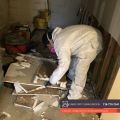What to do when there’s Water Damage Mold, & Mildew at home or business

Mold can be found in a wide variety of places. Mold thrives in places with high humidity, poor ventilation, and little direct sunlight, which is why it's so common in houses or business places. On the other hand, mold growth in your home or business places have the potential to create health problems, allergies, and even structural damage. If you don't get rid of water damage mold, it can spread swiftly and pose a serious health hazard.
Avoiding Mold Growth after Water Damage: Three Easy Steps
Before mildew and mold may begin to grow in the damaged area, you must act fast if water damage has recently occurred in your house or place of business. Fortunately, mildew and mold growth can be stopped by three simple steps: drying, cleaning/disinfecting, and remediation.
1. Dry
Most of the times, when you hear "drying" the afflicted area, you think of something like wiping up soda or water on the kitchen floor. Even a few paper towels won't suffice when dealing with major water damage. Destroying and discarding damaged items may be all that's required to "dry out" your harm.
Remember, though, that mold can grow in almost any area with excess moisture. Due to this and the severity of flooding itself, a variety of equipment is required to provide comprehensive drying of the water-damaged area.
2. Cleaning/Disinfecting
Once you've dried off the area to the best of your ability, it's time to clean. Whatever has come into contact with contaminated water should be cleaned and disinfected. Every hard-surfaced wall and floor, as well as any other impacted surfaces, should be scrubbed and cleaned with soap and water.
You can begin cleaning and disinfecting the area after it has been dried. Using a "clean and dry" method further reduces mildew and mold growth in the home. Ensure to remove any furniture from damp surfaces and wear a mask and gloves when cleaning to protect yourself. Disinfectants and other abrasive materials won't be able to reach your skin, and you won't be inhaling dangerous fumes or particles.
A 10% bleach solution can disinfect a clean area or surface. Wait a minimum of 10 minutes before removing the bleach solution from the surface. Finally, use plain, clear water to rinse and dry the disinfected area.
3. Remediate
It's possible that the instruments and actions indicated above will not be sufficient if you have more than an inch of standing water. Calling a professional mold remediation service is essential when you've had major flooding in your home or office. They'll take care of the situation swiftly, effectively, and safely. After water damage, a good place to start preventing mold growth is to dry the area and clean/disinfect it. A flood that has already caused significant damage may need to hire a team of restoration experts to finish the job for you. Mold remediation is the term for this two-step procedure.
Bay Area Mold Pros is a leading local mold inspection company serving the San Francisco bay area. Bay Area Mold Pros offers professional and unbiased mold testing and mold inspection services. If you suspect that you might have a mold growth issue in your home or business, give us a call (650) 762-6228) at Bay Area Mold Pros we generally be at your home within a day of receiving a call. Our team of specialists will perform onsite inspection and testing services!





